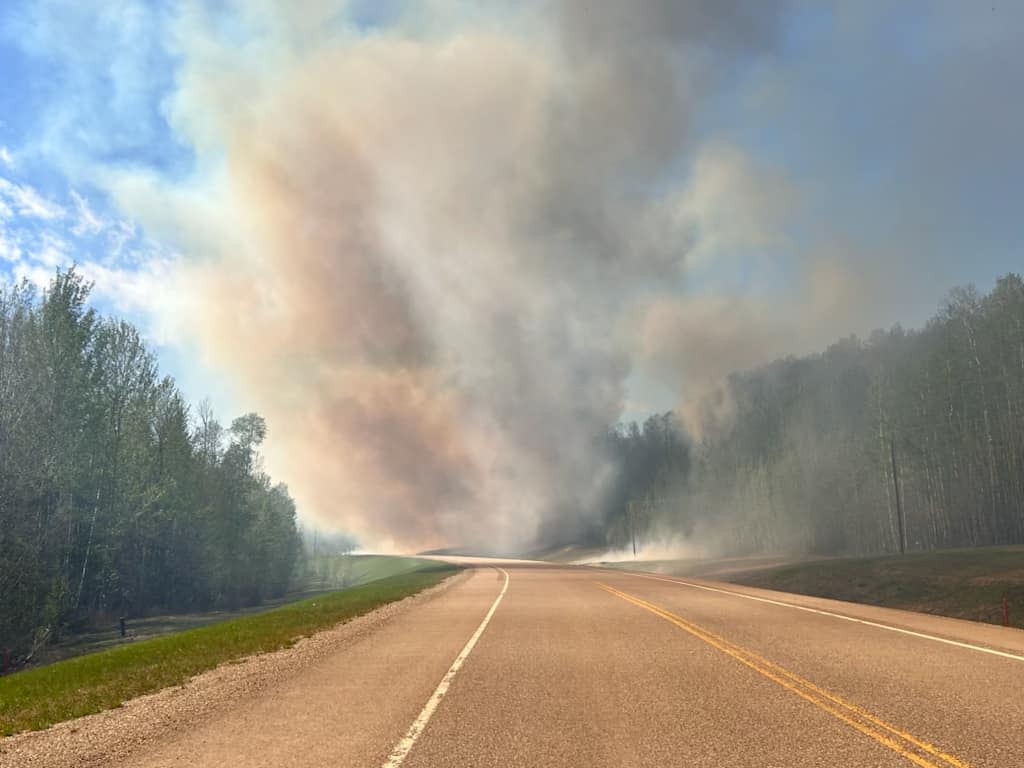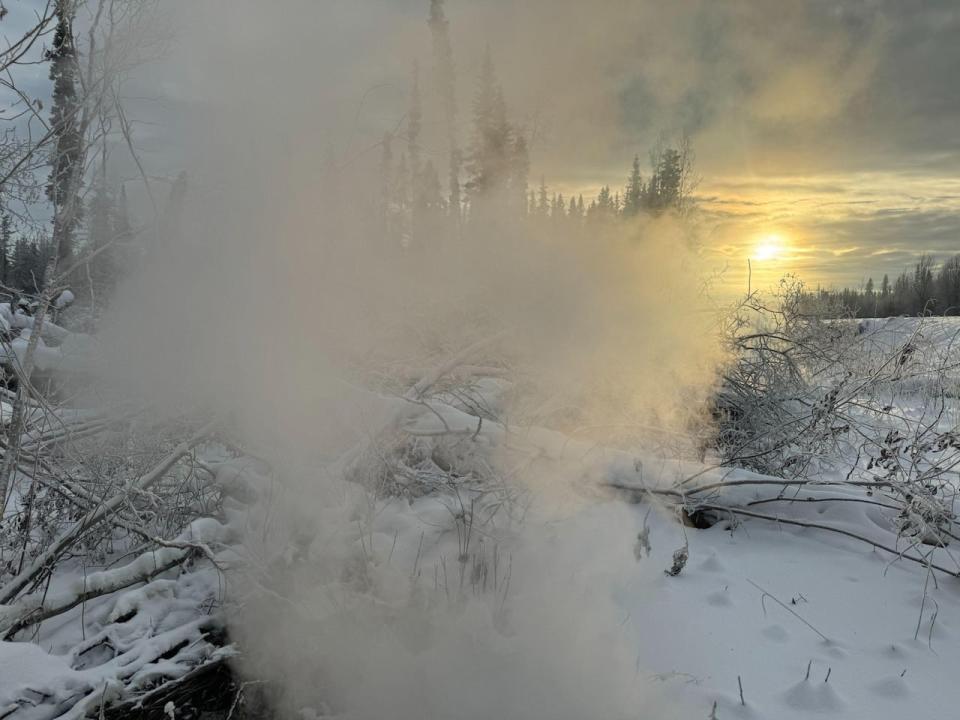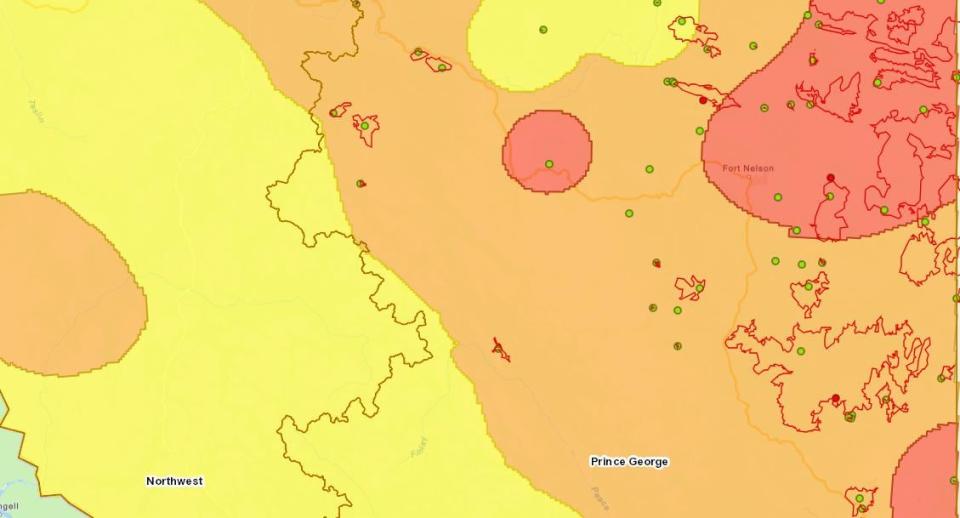Thousands ordered to evacuate Fort Nelson, B.C., due to wildfire

Poor internet connection? Access a low-bandwidth, accessible version of this story on CBC Lite.
Residents of the town of Fort Nelson and Fort Nelson First Nation have been ordered to evacuate due to an out-of-control wildfire in northeast B.C., according to an evacuation order issued by the Northern Rockies Regional District (NRRD) and the nation shortly before 7:30 p.m. PT on Friday.
"Residents are advised to evacuate the area immediately and begin driving south towards Fort St. John. If you have a recreational vehicle, or your own vehicle, fuel stations are being planned along the route south," the NRRD said in a Facebook post.
"If you know of and have the ability to take additional passengers who may need assistance or transportation, please consider doing so."
Fort Nelson is located in northeast B.C. near the border with Yukon, about 1,600 kilometres northeast of Vancouver and 500 kilometres north of Prince George.
Evacuees should report to the the North Peace Arena at 9805 96 Avenue in Fort St John — about 380 kilometres southeast of Fort Nelson — said Jessica Harrison, an information officer for Fort St. John Emergency Support Services.
Harrison says they are expecting more than 3,000 people in the next 18 hours and have enough hotel rooms to shelter everyone.
"We're here at the ready to receive our neighbours," she told CBC News on Friday night. "We're looking forward to welcoming them, even though it's a stressful situation."
Anyone who needs help with transportation should call 250-774-6122 and evacuees should register on the Evacuee Registration and Assistance website at www.ess.gov.bc.ca, the district said.
The B.C. Wildfire Service (BCWS) says the fire is "highly visible" from the town, where approximately 3,400 people live according to the most recent census. It grew to four square kilometres by 6:30 p.m., overwhelming initial instructions to muster at the recreation centre in Fort Nelson.
The fire, about 12 kilometres northwest of town near Parker Lake, has closed Highway 97. Highway 77 north of Fort Nelson is closed due to another fire, according to Drive B.C.
Rob Fraser, mayor of the NRRD, says the fire was started when high winds blew a tree over and it fell onto a power line, causing it to catch fire.
"And then by the time our firefighters were able to get down there, the wind had whipped this up into a fire that they weren't able to handle with the apparatus that we had," he told CBC News Friday night.
BCWS says the fire is being fought by ground crews and two helicopters that are bucketing water on the blaze, and air tanker support has been requested.
It says that in addition to wildfire service firefighters, members of the local fire department and the RCMP are involved.
B.C. Premier David Eby said on social media platform X that he was "thinking of people evacuated from Fort Nelson and Fort Nelson First Nation as wildfire activity grows close to their communities."
"B.C. Wildfire Service is responding and we will be working around the clock to support people."
2 other fires prompt evacuation alerts
The fire comes the day after two sleeper fires from 2023 reignited in the area, prompting an evacuation alert and the deployment of crews to the area.
The Nogah Creek and Patry Creek wildfires, both near Fort Nelson went underground for the winter. They became what's known as sleeper fires — or more menacingly, zombie fires.
This spring, they both reignited after the snow melted and the ground thawed, explained Pedro Roldan-Delgado, an information officer for the B.C. Wildfire Service (BCWS).
Wind this weekend may exceed 70 kilometres per hour, and could shift direction rapidly, according to the BCWS. This creates the potential for extreme fire behaviour at both sites.

A fire smoulders underground near Fort Nelson, B.C., in this file photo. (Submitted by Sonja Leverkus)
Fraser said earlier that residents are apprehensive of the "big dry storm coming through" this weekend.
"These fires are hold-over fires and if the winds pick up in that dry country, we're looking at a big major spread outside the current fire control area," Fraser said.
At the advice of the BCWS, the municipality issued an evacuation alert on May 9, warning residents who live near both fires that they need to be ready to evacuate on short notice. Fraser said the areas are mostly uninhabited, but include some oil and gas camps that may house around 30 people each.
The Nogah Creek fire is about 60 kilometres east of Fort Nelson, while the Patry Creek fire is about 40 kilometres from the junction of the Alaska Highway and Highway 77.
As of May 10, there are 119 active wildfires in the province, but only nine of those fires are categorized as out of control — including the Patry Creek and Nogah Creek fires.

The fire danger rating around Fort Nelson, in B.C.'s far northeast, is rated as "extreme" (red) or "high" (orange). (B.C. Wildfire Service)
Drought conditions
The evacuations and evacuation alerts come as the province reports a snowpack of 66 per cent of normal — a sharp decrease from last year's 91 per cent. According to the province, it's creating a significantly elevated drought hazard.
The BCWS has reported that the conditions around both fire areas resemble those of late summer, even though it's only May.
Fraser said that some locals are critical of the BCWS for not addressing the sleeper fires earlier, including during the winter when the Nogah Creek fire was accessible by road.
"But they didn't hire their crews until late in March, and so they just didn't get out there in time to get some of these fires out," he said.
B.C.'s 2023 wildfire season is widely regarded as the worst on record after about 400 structures were destroyed. Tens of thousands of people were evacuated from their homes, and wildfire damage cost insurance companies more than $720 million.

